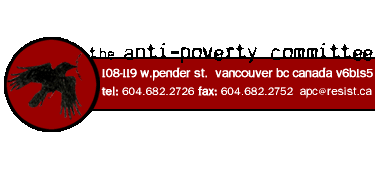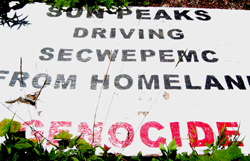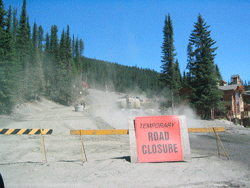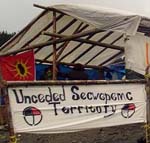 |
|
Home > Campaigns > Indigenous Solidarity > skwelkwek'welt > articles
|
Skiing and Scheming at Sun Peaks:
They’re too busy tearing up the mountain to find time to consult with the displaced Secwepemc.
by Tyler McCreary and Suzanne Mills
Briarpatch Magazine, November 2004
On September 22, 2004, the RCMP raided the camp of the Skwelkwekwelt Protection Center, arrestingthree people. These activists were defending Aboriginal title and rights in the interior of British Columbia, contesting the expansion of the Sun Peaks Ski Resort on the traditional territory of the Secwepemc Neskonlith and Adams Lake bands. The Secwepemc never relinquished this territory to either the provincial or the federal governments by either land claim or treaty.
Since purchasing the resort in 1992, Nippon Cable has expanded on-site accommodation from 100 beds to over 5,800. In 1997 the BC government approved a $70 million expansion, which will eventually cut ski runs on the previously undeveloped Mt. Morrisey and further increase capacity to 20,000 beds. A 2002 Sun Peaks press release boasts that new “facilities line the streets, construction crews abound and a massive new 220 room Delta hotel sits right in the midst of the village.” This encroaching development was further boosted with Vancouver’s recent Olympic bid, and the expansion was again increased in scope, now totaling $285 million.
The Secwepemc assert that the current expansion of Sun Peaks Ski Resort will undermine their ability to exercise their inherent rights to land-use and occupancy and thus their Aboriginal title to the land. The federal and provincial governments have refused to acknowledge Aboriginal title and enter negotiations to establish co-jurisdiction. Moreover, the government has not upheld its fiduciary obligation to consult the Secwepemc. The government disregarded environmental and cultural impact studies performed by the Adams Lake and Neskonlith Indian Bands and refused to engage in consultation and meaningful discussion with the bands about the development. Dispite the lack of consultation, the $70 million development plan, expanding the ski resort to previously undisturbed Mt. Morrisey, has already begun.
In BC, treaty-making was abandoned early on. Throughout the colonial period the government created reserves for the Aboriginal population. However, with the exception of the Douglas treaties on Vancouver Island and the territory east of the Rockies under Treaty 8, these reserves were designated by executive acts unrelated to treaties. Thus, the majority of BC was never “acquired” from its Aboriginal owners before being distributed by the government.
The impetus to begin negotiating to resolve land claims came not from any moral integrity of the federal and provincial governments but from the courts. The governments of Canada and BC long maintained the non-existence of Aboriginal rights and title. In 1973, the Calder decision recognized that at the time of contact Aboriginal title existed. Following this decision, the federal government established its Comprehensive Claims Policy, and began negotiating with the Nisga’a.
BC, however, did not begin negotiating with the Nisga’a until 1990, after further legal challenges by Aboriginal peoples, such as Sparrow and Delgamuukw. It was not until 1993 that the province began to accept other First Nations into the treaty negotiation process. Yet, from the perspective of many Aboriginal groups, the purpose of these negotiations was to eliminate Aboriginal title and to solidify the provincial government as the sole authority in the province. For this and other reasons, the majority of land claims east of the Rockies remain unresolved in BC.
The Delgamuukw decision affirmed inherent Aboriginal title in the courts defining it as “the exclusive use and occupation of the land held pursuant to that title for a variety of purposes.” According to Delgamuukw, to prove Aboriginal title an Aboriginal group must be able to show that they occupied the lands in question at the time that the Crown asserted sovereignty and that this occupation was exclusive. Proof of historical occupancy may be established by providing historical evidence of dwellings, cultivation, or regular use of land for hunting, fishing orother resource use. Present occupation may also be used as proof of pre-sovereignty occupation if a continuous connection to the land between present and pre-sovereignty occupation is demonstrated.
The Delgamuukw decision also stated that the Crown has a fiduciary obligation to recognize the Aboriginal interests, until the dispute over ownership can be resolved. This requirement consists of consulting with aboriginal people and in some instances obtaining consent from Aboriginal people every time that there are potential infringements of Aboriginal title.
The BC government refuses to acknowledge Aboriginal title to groups who have not entered the land claims process. This contradicts the court’s recognition that Aboriginal title is inherent to original peoples and not a function of colonial statute or process. Thus many Aboriginal peoples in BC (approximately 30 percent), who are not involved in land claims talks are not considered to possess Aboriginal Title.
Comprehensive land claims are akin to modern day treaties, whereby the Aboriginal nations concede Aboriginal title and rights to the Canadian government for a specific subset of their traditional rights and lands plus compensation. The intent is to extinguish Aboriginal title, expressed in the Canadian Government’s Comprehensive Land Claims Policy establishing “the certainty of ownership over land and resources.” Thus, through comprehensive land claim agreements Aboriginal groups have obtained: title to a defined amount of land; subsurface rights to a fraction of this land; monetary compensation in various forms; exclusive rights to hunt and fish over a certain area of land; preferential hunting and fishing rights over a larger area; and participation in resource management decisions over the land.
However, land claims in BC are further restricted by the British Columbia Treaty Process. Operating under the Comprehensive Claims Policy, the process is guided by the principles determined by BC Treaty Referendum. Referendum principles state that “Hunting, fishing and recreational opportunities on Crown land should be ensured for all British Columbians; that Parks and protected areas should be maintained for the use and benefit of all British Columbians; and that Province-wide standards of resource management and environmental protection should continue to apply.”
These principles directly conflict with the maintenance of Aboriginal title as recognized in the Supreme Court’s Delgamuukw, decision. Disregarding Aboriginal title and rights, the government is placing a foreign corporation’s profits before the well-being of Canada’s first peoples. Chief Edward John of the First Nations Summit of British Columbia explains, “When government asks us to agree to surrender our title and agree to its extinguishment, they ask us to do away with our most basic sense of ourselves, and of our relationship to our Creator, our territory and the other peoples of the world. We could no longer do that without agreeing that we no longer wish to exist as a distinct people.”
The government’s disregard for the rights of the Secwepemc people has prompted the United Nations to investigate the dispute; however, to ensure a just resolution to the conflict continued pressure is necessary.
You can help by taking the following actions:
- Boycott Sun Peaks and Delta Hotels.
- Write letters to the BC and Canada Governments as well as the
management of Sun Peaks and Delta
Hotels to pressure them to recognize Aboriginal rights and title in
Skwelkwek’welt (territory
encompassing Sun Peaks).
- Contribute to support the Secwepemc struggle.
Tyler McCreary and Suzanne Mills live in Saskatoon, SK where they are active in the community and at the University of Saskatchewan. Suzanne is completing a PhD in Geography, while Tyler is preparing for graduate school next year.
This article originally appeared in Briarpatch magazine ( www.briarpatchmagazine.com ).
The Olympics Land Grab
by Naomi Klein > July 16 2003
In sports, as in life, “security” trumps peace.
That’s what happened when the International Olympic Committee faced a choice between Pyeongchang, South Korea and Vancouver for the 2010 Winter Games.
South Korea pitched itself as the Peace Candidate: with the world in turmoil, bring the games to the very border of George Bush’s “Axis of Evil” and make a gesture of reconciliation. more==>
Resistance Without Reservation

Sun Peaks Resort and Delta Hotels are built on Secwepemc territories that have never been ceded or surrendered. Land and Water BC disregarded the Secwepemc, who said NO to expansion in stakeholder meetings, and in June 2001 obtained a court injunction to forcibly remove Secwepemc from their homelands. The Skwelkwek’welt Protection Center, at the Resort's entrance, claims Aboriginal Title & Rights. For this exercise of rights, 54 arrests with charges from criminal contempt and intimidation by blocking a road to resisting arrest have been made.
In January 2003, a BC judge found four Elders not guilty for refusal to obey an injunction to tear down the Center, and as she left court, Elder Irene Billy stated: "I always knew we were right, this is our land, and Sun Peaks and the province cannot remove us from it."
With the 2010 Olympic bid, environmental destruction and expansion on unceded territories will be perpetuated yet further. In the spirit of solidarity movements that honour front-line struggles of communities, rather than organizing actions in the city, it is imperative to escalate the fight against state and corporate colonialism on the territories itself.
Go to Skwelkwek'welt article on ZMag
Go to Campaign Against Sun Peaks
|
Sun Peak's Environmental Destruction

In 1997, the BC government approved a $70 million development plan, allowing Sun Peaks to continue to expand their resort to 20,000 beds and put ski runs on the previously undisturbed Mt. Morrisey. The Secwepemc attended stakeholder meetings and clearly said no to the development. Land and Water BC however, clearly disregarded their voices and granted new leases to Sun Peaks to facilitate their expansion, and in June 2001, Land and Water BC obtained a court injunction to forcibly remove Secwepemc from their lands. To date, 54 arrests with charges from criminal contempt and intimidation by blocking a road to resisting arrest have been made.
more==>
|
|
|
|

|

|
 Skwelkwek'welt Solidarity 
Home
Updates
Media Reports
Press Releases
Articles
Documents
Campaign
Photos
Posters
Audio & Video
Convergence Info
Upcoming Events

Sun Peaks is built on Secwepemc land, which the Secwepemc refer to as Skwelkwek’welt, located in BC’s interior, 30 km NE of Kamloops. Secwepemc have never ceded, surrendered or released their land in any way. In 1997, the BC government approved a $70 million development plan, allowing Sun Peaks to continue to expand their resort to 20,000 beds and put ski runs on the previously undisturbed Mt. Morrisey. The Secwepemc attended stakeholder meetings and clearly said no to the development. Land and Water BC however, clearly disregarded their voices and granted new leases to Sun Peaks to facilitate their expansion, and in June 2001, Land and Water BC obtained a court injunction to forcibly remove Secwepemc from their lands. To date, 54 arrests with charges from criminal contempt and intimidation by blocking a road to resisting arrest have been made.
FOR MORE INFO ON SECWEPEMC RESISTANCE:
Turtle Island Native Network News - Secwepemc
Union of BC Indian Chiefs - Sun Peaks
Skwelkwekwelt Protection Centre
Recent Article:
ZMag
Land, Freedom and Decolonization Coalition
Land, Freedom, Decolonization Coalition is a network of groups and individuals in Vancouver from Native Youth Movement, Native Solidarity Network, No One is Illegal, Refugees Against Racial Profiling, South Asian Network for Secularism and Democracy, Palestine Community Center, Anti-Poverty Committee, International Solidarity Movement, Bus Riders Union, South Asian Youth Alliance, Friends and Families of Mexican Political Prisoners, Committee for Solidarity with Columbia, and others.
|
|